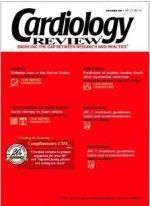Publication
Article
Research on prognostic indicators
This month’s issue of Cardiology Review features several research reports that focus on prognos-
tic indicators, such as high uric acid levels in chronic heart fail-ure and discharge electrocardiograms (ECG) versus admission ECGs. In the diabetes section, Dr. Catherine S. McLellan and colleagues from Canada compare nonurgent coronary artery stenting in 2,064 patients with or without diabetes. Patients were randomly assigned to treatment with either eptifibatide or placebo. The antiplatelet agent had similarly beneficial effects in both groups of patients, although as in other stent studies, diabetic patients continued to fare more poorly, as noted by Dr. Stanley Katz in his commentary.
Are high uric acid levels a prognostic marker in chronic heart failure patients? That is the question asked by Drs. Wolfram Doehner and Stefan D. Anker from Germany in their study of 112 patients in the heart failure section. Drs. Dawn Lombardo and Peter M. Buttrick comment on their provocative findings.
In the CAD/Angina section, Drs. Yuling Fu and Paul W. Armstrong from Canada ask the question: did the discharge ECG provide additional prognostic data from that acquired on admission in 918 patients with non-ST segment elevation acute coronary syndromes? The clinical implication of their “yes” answer is discussed by Dr. Steven Borzak in his commentary.
This issue is also highlighted by an article in the lipid disorders section by Drs. Jeffrey T. Kuvin
and Richard H. Karas. They evaluate the relationship between high-density lipoprotein (HDL) cholesterol levels and peripheral
vascular function, the latter measured by high-resolution brachial artery ultrasound testing. In the 150 subjects studied, they found HDL to be an independent predictor of flow-mediated dilation. The higher the HDL level, the more preserved was peripheral endothelial function. Drs. Melind Y. Desai, Juan Carlos Hernandez, and Roger S. Blumenthal note in their commentary for this study that further trials are needed, but it is becoming clear that HDL cholesterol should be treated more aggressively.
